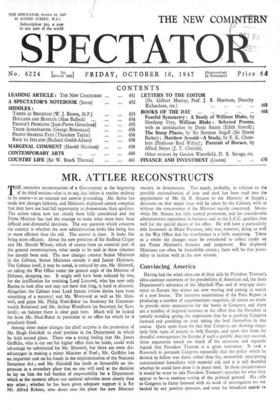MR. ATTLEE RECONSTRUCTS
HE .extensive reconstruction of a Government at the beginning of its third session—that is to say, just before it reaches midway in its course—is no unusual nor unwise proceeding. Mr. Attlee has made few changes hitherto, and Ministers displaced cannot complain that they have not had full opportunity to demonstrate their qualities. The action taken now has clearly been fully considered and the Prime Minister has had the courage to make what must have been difficult and distasteful decisions. The one question which concerns the country is whether the new administration looks like being less or more efficient than the old. The answer is clear. It looks like being more efficient. About the new positions of Sir Stafford Cripps and Mr. Harold Wilson, which of course form an essential part of the general reconstruction, what needs to be said in these columns has already been said. The new changes concern Senior Ministers in the Cabinet, Senior Ministers outside it and Junior Ministers. The Cabinet itself, it may be noted, is reduced by one, Mr. Shinwell, on taking the War Office under the general aegis of the Minister of Defence, dropping out. It might well have been reduced by two, for the justification for retaining Lord Listowel, who has now only Burma to look after and may not have that long, is hard to discover. Altogether the Cabinet loses Lord Inman (whose duties have been something of a mystery) and Mr. Westwood as well as Mr. Shin- well, and gains Mr. Philip Noel-Baker (as Secretary for Common- wealth Relations) and Mr. Arthur Woodburn (as Secretary for Scot- land); on balance there is clear gain here. Much will be looked for from Mr. Noel-Baker in particular in an office for which he is peculiarly fitted.
Among other major changes the chief surprise is the promotion of Mr. Hugh Gaitskell to chief position in the Department in which he held second place. There was a strong feeling that Mr. James Griffiths, who is cut out for higher office than he holds, could with advantage be substituted for Mr. Shinwell, but there are some dis- advantages in making a miner Minister of Fuel ; Mr. Griffiths has an important task on his hands in the implementation of the National Insurance Act ; and Mr. Gaitskell has made so favourable an im- pression in a secondary place that no one will cavil at the decision to lay on him the full burden of responsibility for a Department which at the moment affects our national salvation more closely than any other ; whether he has been given adequate support it is for Mr. Alfred Robens, who drops into the place the new Minister vacates, to demonstrate. Too much, probably, in relation to the possible nationalisation of iron and steel has been read into the appointment of Mr. G. R. Strauss to the Ministry of Supply ; decisions on that major issue will be taken by the Cabinet, with or without the concurrence of the Minister mainly concerned. Mean- while Mr. Strauss has fully earned promotion, and his considerable administrative experience in business and in the L.C.C. qualifies him well for the special duties of his office. He will have a particularly able lieutenant in Major Freeman, who was, however, doing so welt at the War Office that his transference is a little surprising. Taken as a whole the changes must be considered to reflect credit on the Prime Minister's firmness and judgement. But displaced Ministers can often be formidable critics ; there will be that possi- bility to reckon with in the new session.


































